I have learned from creating content for the internet that if you want people to discover your work, you need search engine optimization (SEO). Let’s have an overview.
What is SEO?
Search Engine Optimization (SEO) refers to the process of improving the quality and traffic to your web pages through organic search engine results.
How does SEO Works?
This Process can be broken down into three main stages i.e., Crawling, Indexing and Ranking.
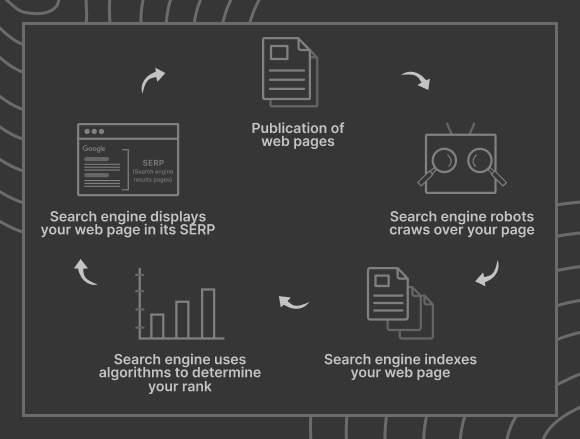
Crawling: Search engines send out web crawlers (called as ‘spiders’ or ‘robots’) to find new pages and periodically check the content on pages they have previously visited to see whether they’ve changed or been updated.
Indexing: When a search engine indexes content, it looks at the title, headings, and body text to decide whether to use it.
Websites may not be indexed if:
- Duplicate content
- Low-quality or spammy content
- The page or domain lacked inbound links
Ranking: The ranking process begins once the search engine crawls and indexes your site. A searcher’s query determines how relevant and valuable a page is to Google.
Some factors that search engines use to rank web pages are:
- Keyword presence in the title tag
- Web page loading speed
- Reputation of the website
3 Pillars of SEO
A search engine uses more than 200 ranking signals to sort and rank content, and these signals all fall under the three pillars of SEO i.e., Technical Optimization, On-Page Optimization, and Off-Page Optimization.
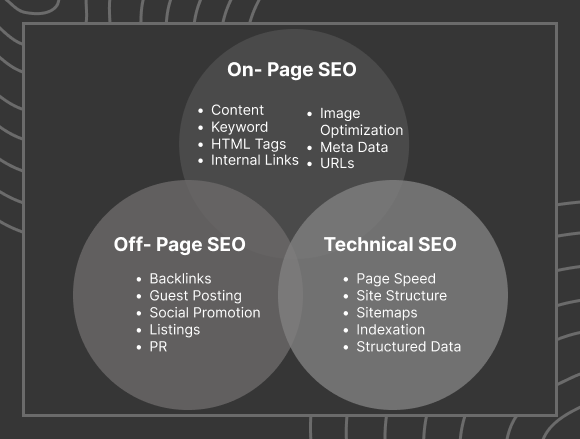
On Page Optimization: The term “on-page SEO” refers to the efforts you make directly to the page you’re optimizing, such as improving its content or adding keywords.
Off Page Optimization: In off-page SEO, you promote your site in other places, such as through backlinking, listings, social networking, guest posting, public relations, etc.
Technical Optimization: The practice of technical SEO involves optimizing your website’s technical aspects in order to rank higher in SERP (search engine results page) .
This includes factors like javascript execution time, removing unused css or javascript, lazy loading or on demand loading of resources, implementing good cache policy, sitemap, speed, security, mobile-friendliness, indexation, and crawl-ability.
SEO Best Practices
There are several strategies and techniques you can follow that can improve your chances of ranking. Here are some of the best practices for SEO:
1. Align Your Content with Search Intent
An SEO best practice is to always keep the search intent (also called “user intent”) in mind while creating content for your website.
Consider the search results for “how to make oatmeal cookies” , Most of the top search results are blog posts or videos, not eCommerce pages selling oatmeal cookies.
It is clear to Google that people who conduct this specific search are looking to learn, not buy.
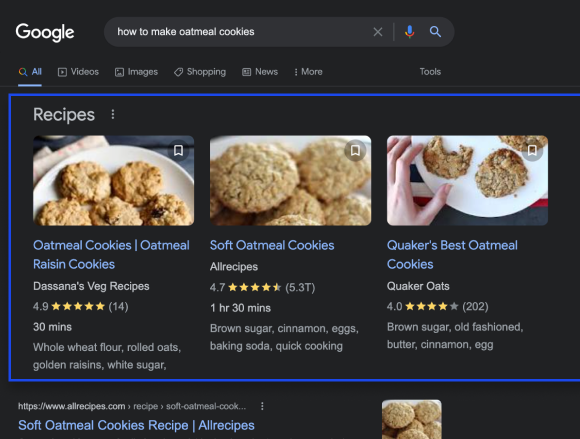
Conversely, the top search results for “buy oatmeal cookies” are usually eCommerce sites. In this case, Google understands that people are in the buying mode and show the results in SERP accordingly.
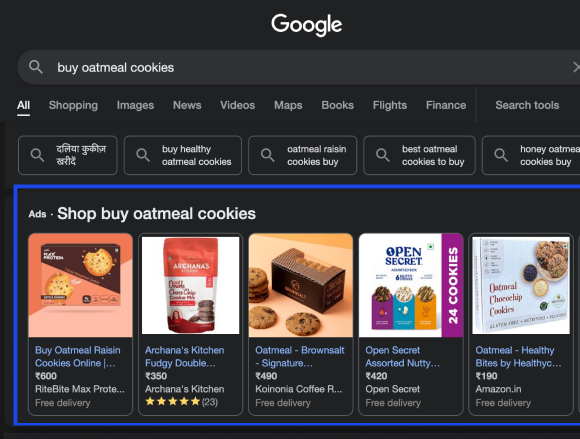
2. Write a Compelling Title Tag and Meta Description
A title tag is a clickable headline that appears in SERP (search engine results page) , and they are extremely important for SEO. Titles are often the primary piece of information to quickly understand what a result contains and why it’s relevant to their query.
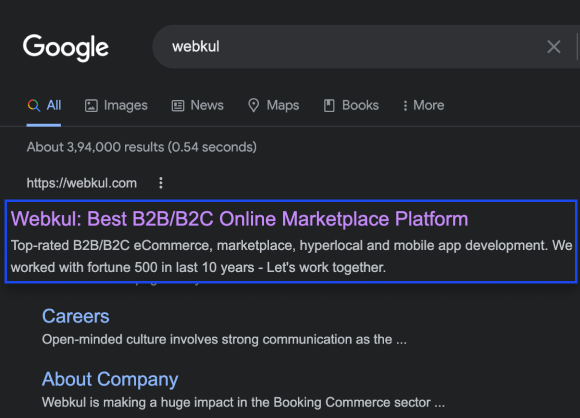
Below the title tag of a page in the SERP is a meta description. Meta descriptions should provide users with a brief, relevant summary of what a specific page is about. It can be of 156 to 160 characters.
For Example ( Check above image for reference):
Title Tag: Webkul: Best B2B/B2C Online Marketplace Platform
Meta Description: Top-rated B2B/B2C eCommerce, marketplace, hyperlocal and mobile app development. We worked with fortune 500 in last 10 years – Let’s work together.
3. Optimize Your Images
Visitors to your site benefit greatly from images. The right use of images can boost your site’s organic traffic and SEO.
Here are some things you can do to optimize your images.
- Choose the best file format like webP or png. Before using webP, please check how to implement webP images.
- Provide Alt Text for Images
- Compress Your Images
- Relevant Naming of Images
4. Make URLs SEO-Friendly
An often overlooked aspect of SEO is URL structure. A good URL structure provides not only users but also search engines an idea of what the destination page is all about.
Here are some points to improve your URL structure
- Include Keywords in URLs
- Use Hyphens to Separate Words
- Keep URLs Short
Example of URLs
Optimized: http://example.com/blog/url-optimization-tips
Not Optimized: http://example.com/blog/url_optimization_tips
5. Earn Authoritative Backlinks
Despite several changes to Google’s search algorithm and ranking system, backlinks remain a key ranking factor.
Google recognizes backlinks as votes of confidence.
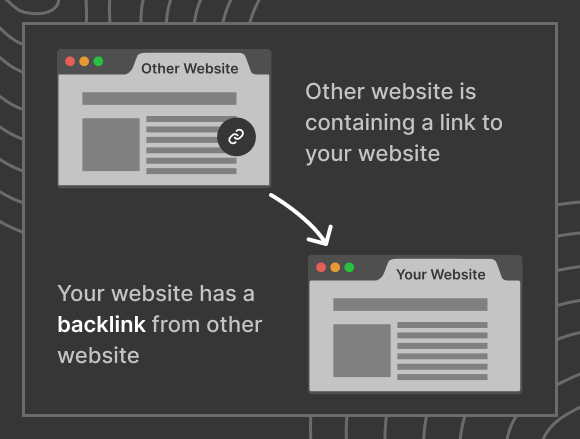
The votes tell search engines that this content is valuable, credible, and useful.
As a result, the more of these “votes” you have, the higher your site will rank in google and other search engines.
Final Words
To improve your website’s Google ranking, you need to consider many SEO factors. Focusing on the most important ones and taking actionable steps to improve them will improve your site’s ranking.
You can improve the search engine rankings of the store for different platforms by using these extensions – Webkul Store SEO Extensions
Remember, SEO is a long-term game. Results take time and effort. Your website’s ranking will eventually rise if you’re consistent with your efforts.
Thanks for reading this article!

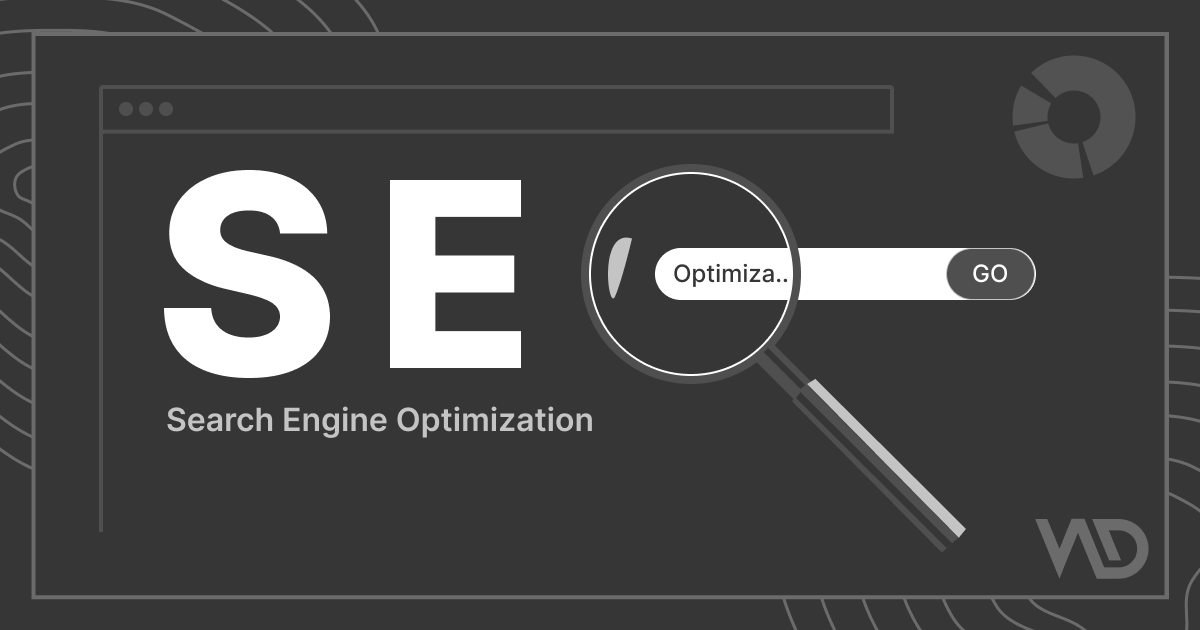

6 comments